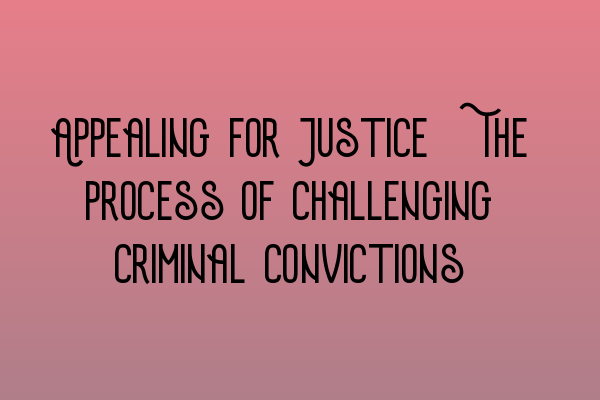Appealing for Justice: The Process of Challenging Criminal Convictions
Gaining a criminal conviction is a serious matter. It can have significant consequences on your life, tarnishing your reputation and affecting your personal and professional opportunities. However, the justice system acknowledges that mistakes can happen, and innocent individuals can be wrongfully convicted. In such cases, there is a legal process in place to challenge the conviction and seek justice.
The Appeal Process
The appeal process allows individuals convicted of a crime to challenge their conviction and present new evidence or legal arguments that could potentially overturn the decision. This process is complex and requires the assistance of a skilled solicitor who specializes in criminal law.
When appealing a criminal conviction, it is crucial to adhere to strict timelines and follow specific legal procedures. Failure to do so may result in the appeal being dismissed.
Grounds for Appeal
An appeal is not a retrial of the case; rather, it focuses on errors that may have occurred during the original trial or the discovery of new evidence that could impact the verdict. Some common grounds for appeal include:
- Insufficient evidence: If there is a belief that the evidence presented during the trial was not sufficient to support a guilty verdict, an appeal can be made.
- Misapplication of the law: If there is a belief that the judge misinterpreted or misapplied the law during the trial, an appeal can be pursued.
- New evidence: If new evidence emerges after the trial that could potentially change the verdict, an appeal can be filed.
- Procedural irregularities: If there were errors or irregularities in the court procedures or the conduct of the trial that could have affected the outcome, an appeal can be sought.
It is essential to work closely with a knowledgeable solicitor who can assess the viability of an appeal based on the specific circumstances of your case.
The Appeals Court
Appeals are typically heard in higher courts, such as the Court of Appeal or the Supreme Court, depending on the jurisdiction and the seriousness of the conviction. These courts have the power to review the original trial and consider the arguments and evidence presented by the appellant.
The appeals court will review the case to determine if there were any legal errors made during the trial that may have affected the outcome. They will consider the arguments put forth by the appellant’s legal team and the response from the prosecution.
If the appeals court finds that a legal error was made or that the conviction is unsafe, they have the authority to quash the conviction, order a retrial, or amend the sentence.
The Role of a Skilled Solicitor
When challenging a criminal conviction, having a skilled and experienced solicitor by your side is essential. They will guide you through the entire appeals process, ensuring that all necessary paperwork is filed on time, and the strongest arguments are presented to the court.
A knowledgeable solicitor will conduct a thorough review of the trial record, analyze the evidence, and identify any potential legal or procedural errors that can form the basis of an appeal. They will also assist in gathering new evidence, if applicable, and preparing persuasive legal arguments to present to the appeals court.
It is important to choose a solicitor who specializes in criminal law and has a proven track record of successfully handling appeals. Their expertise and understanding of the intricacies of the criminal justice system will significantly increase your chances of a favorable outcome.
Conclusion
If you believe you have been wrongfully convicted of a crime, it is crucial to seek legal advice from a skilled solicitor as soon as possible. The appeal process can be complex, but with the right representation, you may be able to challenge your conviction and obtain justice.
For more information about SQE Criminal Law & Practice in the UK, feel free to explore the following related articles:
- SQE 1 Practice Exam Questions
- SQE 1 Practice Mocks FLK1 FLK2
- SQE 2 Preparation Courses
- SQE 1 Preparation Courses
- SRA SQE Exam Dates
